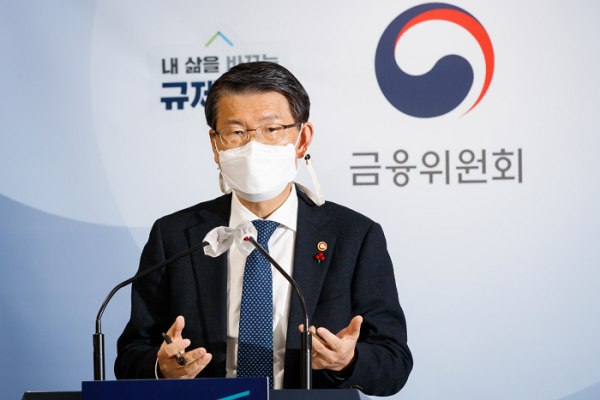[미디어펜=백지현 기자] Since the beginning of this year, the financial sector has been struggling with the pressure of’government finance’. Recently, the ruling party in power has set fire to government finance by pointing to financial sectors including banks as the main target of participation in the’profit sharing system’, and this time, financial authorities officially recommend reducing dividends from banks.
 |
||
| ▲ Eun Seong-soo, chairman of the Financial Services Commission./Photo = Provided by the Financial Services Commission | ||
According to the financial sector on the 28th, the Financial Services Commission advised domestic banking holding companies and banks to temporarily pay dividends within 20% of net profit by the end of June this year to respond to Corona 19. This is 5 to 7 points lower than last year. However, dividends from banks belonging to bank holding companies to holding companies and policy financial institutions such as Korea Development Bank, IBK, and Export-Import Bank were excluded from the recommendations.
This is based on the judgment that banks need to possess sufficient capacity to absorb losses in order to fulfill their natural role in a crisis situation in which Corona 19 is prolonged. Earlier, from October to December of last year, the Financial Supervisory Service conducted a stress test on 8 domestic banking holding companies and 6 banks that were not affiliated with the holding company. This stress test assumes a crisis of greater intensity than the 1997 financial crisis (economic growth rate -5.1%).
As a result of the evaluation, it was found that in the U-shaped (long-term recovery) and L-shaped (long-term recession) scenarios, all banks’ capital ratios exceeded the minimum obligation ratio, but in the case of the L-shaped, many banks did not exceed the dividend-limiting regulatory ratio. This means that banks generally maintain their ability to absorb losses, but some banks may not have enough capital if the Corona 19 is prolonged.
The financial authorities have been discussing with the banking sector on ways to reduce dividends since the end of last year, but this is the first time that an official recommendation has been issued. In the banking sector, it is called a’recommendation plan’, but it is an atmosphere that accepts it as a’warning plan’ to pressure implementation. However, with the recent sluggish banking stocks, the recommendation to reduce dividends is expected to have a negative impact on the stock price, so it is difficult to accept it quickly.
An official of a financial holding company said, “If you accept the demand for dividend reduction, there is a great concern that shareholder value will be damaged,” and “It will have a considerable impact on the loss of consistency of dividend policy and the decline in credibility.”
In the financial sector, voices of concern and dissatisfaction over the’governance’ that politicians and financial authorities are trying to excessively intervene in decisions made by financial companies are growing. On the 19th, Hong Ik-pyo, together with the Democratic Party Policy Committee Chairman, insisted on the financial sector as part of the profit-sharing system that “banks should lower or stop interest”, sparking a controversy over government administration.
An official from the financial sector said, “I am concerned about the movement to intervene beyond the line in matters to be decided by financial companies, such as the bank’s remarks on the profit-sharing system, which have emerged in the political world recently.” It’s a difficult idea to understand.”
